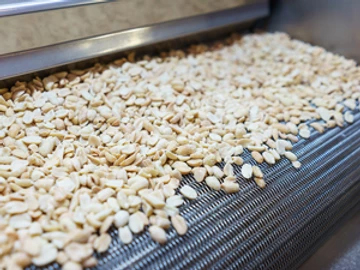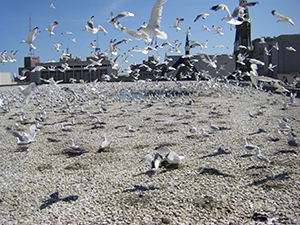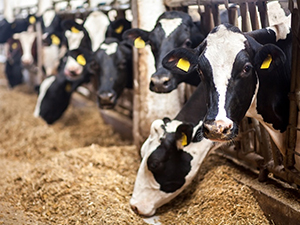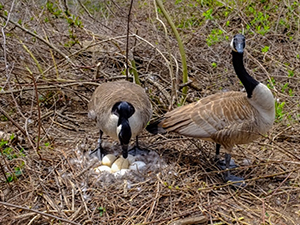Bird Deterrence for Food Safety: Combating Threat vs. “Nuisances”
Apr 8, 2020Professional bird control services provide an important benefit to many businesses responsible for the health and safety of their customers, visitors and workforce.
But few have as great a responsibility to public health and safety as those in the food supply chain. In ordinary times, most people don’t give a thought to the health and safety threats that can come between food producers and a safe and plentiful supply of the products that fill our grocery carts.

For food growers, manufacturers and processors, and the government agencies that oversee their compliance with government health and safety regulations, it’s a year-round concern – and viral threats come in many varieties.
Bird Risks to the Food Chain
The Food Safety Modernization Act (FSMA) was designed to enforce standards by which consumers could have faith that the food supply was protected from a wide variety of hazards, including those created by birds.
Birds pose numerous health threats for food producers, from the hazards created when birds get inside facilities to the pathogens and diseases spread by bird droppings.
An open door, a broken vent or a garage that allows birds to fly into your factory are all threats to food production and could cause violations under FSMA, which ensures that the food supply stays healthy and safe with rules and preventive controls for food manufacturing facilities and the safe production and harvesting of fruits and vegetables.
Failure to comply can result in a cascade of problems from the spread of disease to production disruptions that include a permanent shutdown.
Peanut Butter Manufacturer Cited for Bird-Linked Salmonella Outbreak
The first facility to have its registration suspended under FSMA had bird-related problems. A Federal Drug Administration inspector found a “failure to store raw materials in a manner that protect against contamination,” several months before the FDA suspended operations for the manufacturer of peanut butter.
The company stored raw-shelled peanuts outdoors and “birds too numerous to count were observed flying over and landing on the in-shell peanuts. Apparent bird excreta also was observed on some of the in-shell peanuts,” the inspector wrote.
In November of 2012, The FDA suspended the peanut butter manufacturer’s food facility registration after the product was linked to a Salmonella Bredeney outbreak in 20 states.
Staying Compliant with FSMA
Salmonella bacteria is found in the intestinal tracts of humans and other animals, including birds, according to the Centers for Disease Control and Prevention. Salmonella can be transmitted to humans when they eat food contaminated by animal feces.
Under FSMA, food facilities are required to implement a preventative controls plan to keep food safe for the consumer. The law gives the FDA oversight to perform mandated inspections, issue mandatory recalls and suspend a facility’s registration.
Under the law, the FDA has cited businesses for failure to properly maintain buildings and facilities in a clean condition. Companies are usually given 15 days to take steps to correct problems found by inspectors.
Don’t Wait for a Citation, or Worse…
Safe and sanitary food plant and agricultural processing requires a plan for bird control. Birds are incredibly persistent in their efforts to find food, water and nesting areas. They will peck at insulation, deposit waste on rooftops, nest in a vent or roost nearby waiting for a chance to fly into a facility that provides a ready source of food and water.
A diligent system of assessment and remediation can help you clear up a potential hazard before it becomes something worse.
The experts at Wild Goose Chase can help. Our consulting team includes wildlife and environmental biologists and construction specialists who provide site specific assessments and recommendations for eliminating conditions that invite birds to your property.
We provide a wide range of assessments, management and deterrent strategies for all types of bird issues including lasers, nest and egg depredation, structural deterrent, community education and canine control.
Contact us to learn more about bird control in food processing




 0
0
